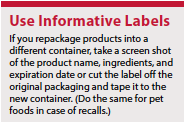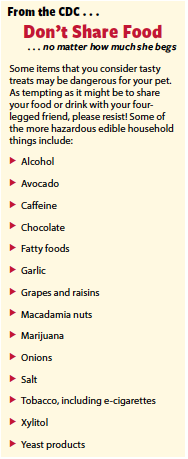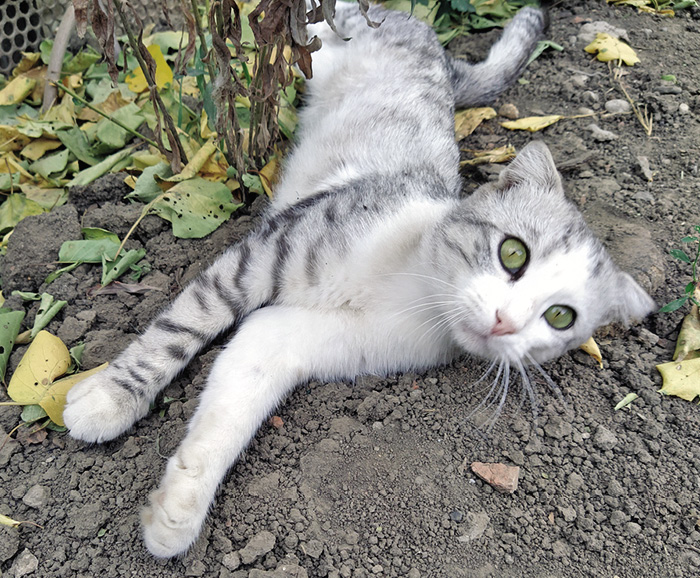If you think your cat has gotten into something toxic, there are steps for you to take immediately, including calling your veterinarian or animal poison control. If possible, have one person start to treat the cat as described in this article while the other makes the call. Some substances are caustic to the skin itself, while others are only toxic if your cat licks them off and ingests them, but you must find out for certain. Assume it’s a toxin until you know otherwise.
Be prepared to provide accurate information to your veterinarian or poison control. Know your cat’s weight. What might not be a problem for a 12-lb mature cat could be toxic to a 3-lb kitten.
If you know what the product was, have the packaging handy when you call to answer questions.
Permethrins
If your cat has something on her hair, such as the dog’s spot flea/tick preventative, start with a bath with Dawn dish soap. Yes, use Dawn because it’s effective and safe at removing toxins from the fur and skin of animals exposed to a wide variety of hazardous substances.
Permethrin, a chemical contained in various flea and tick products for dogs, is potentially lethal for cats. Never use a canine parasite control product on your cat, no matter what it is. Do not allow your cats to mingle with your dogs for 72 hours after application of one of these products, as even contact with the “greasy spot” between your dog’s shoulder blades can make your cat deathly ill.
Foods
A number of human foods, including grapes, garlic, onions, and chocolate, can be toxic to cats if ingested in sufficient quantities.
Xylitol
This sweetener commonly found in chewing gum and human foods is toxic to cats. If you find chewing gum containing xylitol on your cat’s fur, some vegetable oil can loosen the offending substance so you can remove it, or cut it off with scissors. Although cats are not as susceptible as dogs to xylitol, contact your veterinarian immediately as it can cause dangerous hypoglycemia (low blood sugar) and liver damage.
Eye Contamination
Your first-aid kit should include sterile saline solution or an ophthalmic saline solution to flush your cat’s eyes if she gets something in them. Head for your veterinarian after a thorough flush, since the cornea and other sensitive tissues will need to be checked for damage.
Medications
Keep all medications in their original containers, which show the amount of medication in each pill, liquid, or topical preparation as well as the number of pills or the volume of liquid, cream, or gel. Remember that cats can be poisoned if they are given an incorrect dose of a feline product, too. Due to their unique physiology, many human medications, including acetaminophen, are quite toxic to cats.
Household Products
Essential oils such as citrus and tea tree oils can be toxic to cats if they are either inhaled in aerosol form or ingested.
Some household cleaners can cause toxicity if your cat strolls across a wet and freshly mopped floor.
A common source of potentially life-threatening feline intoxication is antifreeze ingestion. Even tiny amounts of antifreeze that drip onto a garage floor can prove fatal for cats if ingested. Cats, unfortunately, are often attracted to the taste of antifreeze.
Plants
A wide range of houseplants can be toxic to your cat. Common culprits include philodendrons, lilies, poinsettias, and rhododendrons. It is best to consult a listing of poisonous plants before bringing any home. While you may be able to safeguard your plants and your cat, it’s best to simply avoid having poisonous plants in your home.
If you let your cat go outside, check your garden and flower beds. Herbicides and some fertilizers can be toxic. Your cat can become ill simply by walking in these toxins and licking them off her paws while grooming.
Another concern for outdoor cats, depending upon where they live, is interactions with poisonous/venomous creatures. Poking a snake, toad, or scorpion might seem like fun to a curious cat, but can result in uncomfortable and potentially life-threatening poisoning.
Be Wary of Old Wives’ Tales
Do not try to induce vomiting in a cat that may have ingested a poison unless instructed to do so by your veterinarian. Some toxins can do more damage to the gastrointestinal tract and/or lungs if they are vomited up.
Stay Informed
Always contact your veterinarian or animal poison-control center if you are in doubt about  whether something your cat has been exposed to is toxic. Monitor and monitor your cat for three to five days for symptoms suggesting that she may not be well, such as not eating, lethargy, hiding, and hyperactivity after exposure.
whether something your cat has been exposed to is toxic. Monitor and monitor your cat for three to five days for symptoms suggesting that she may not be well, such as not eating, lethargy, hiding, and hyperactivity after exposure.

You can find a list of potential feline toxins on the Cornell Feline Health Center’s website at:
https://www.vet.cornell.edu/departments-centers-and-institutes/cornell-feline-health-center/health-information/feline-health-topics/common-cat-hazards-0




